Abstract
Background
The incidence of young-onset colon cancer is increasing. This study investigated the extent to which financial hardships associated with colon cancer care are associated with patient age.
Methods
A consecutive sample of patients with non-metastatic colon cancer who underwent resection at a comprehensive cancer center between 2017 and 2019 were retrospectively enrolled from a clinical database. Patients with one or more of the following events associated with their colon cancer care were categorized as having experienced financial toxicity: two or more bills sent to collections, application for a payment plan, settlement, bankruptcy, or enrollment in a financial assistance program.
Results
Of 764 patients identified, 157 (21 %) experienced financial toxicity. In a univariable analysis, financial toxicity was significantly associated with younger age, female sex, nonpartnered marital status, and median income by ZIP code area (p < 0.05). A multivariable analysis showed that with each 10-year decrease in patient age, the odds of financial toxicity increased by 30 % (odds ratio [OR], 1.30; 95 % confidence interval [CI], 1.14–1.48). With each $50,000 decrease in median income by ZIP code area, the odds of financial toxicity increased by 35 % (OR, 1.35; 95 % CI, 1.05–1.74).
Conclusions
Younger patients with colon cancer are at greater risk for financial toxicity than older patients. As this population continues to grow, so will the need for timely and effective financial support mechanisms.

Similar content being viewed by others
References
Zafar SY, Abernethy AP. Financial toxicity, part I: a new name for a growing problem. Oncology. 2013;27(80–81):149.
Mariotto AB, Enewold L, Zhao J, Zeruto CA, Yabroff KR. Medical care costs associated with cancer survivorship in the United States. Cancer Epidemiol Biomark Prev. 2020;29:1304–12. https://doi.org/10.1158/1055-9965.EPI-19-1534.
Aviki EM, Manning-Geist BL, Sokolowski SS, et al. Risk factors for financial toxicity in patients with gynecologic cancer. Am J Obstet Gynecol. 2022;226:817.e1-817.e9. https://doi.org/10.1016/j.ajog.2021.12.012.
Desai A, Gyawali B. Financial toxicity of cancer treatment: moving the discussion from acknowledgement of the problem to identifying solutions. EclinicalMedicine. 2020;20:100269. https://doi.org/10.1016/j.eclinm.2020.100269.
Lentz R, Benson AB, Kircher S. Financial toxicity in cancer care: prevalence, causes, consequences, and reduction strategies. J Surg Oncol. 2019;120:85–92. https://doi.org/10.1002/jso.25374.
Gilligan AM, Alberts DS, Roe DJ, Skrepnek GH. Death or debt? National estimates of financial toxicity in persons with newly-diagnosed cancer. Am J Med. 2018;131:1187-99.e5. https://doi.org/10.1016/j.amjmed.2018.05.020.
de Souza JA, Yap BJ, Wroblewski K, et al. Measuring financial toxicity as a clinically relevant patient-reported outcome: the validation of the Comprehensive Score for financial Toxicity (COST). Cancer. 2017;123:476–84. https://doi.org/10.1002/cncr.30369.
Siegel RL, Miller KD, Fuchs HE, Jemal A. Cancer statistics, 2022. CA Cancer J Clin. 2022;72:7–33. https://doi.org/10.3322/caac.21708.
Paro A, Hyer JM, Shaikh CF, Pawlik TM. Financial impact of out-of-pocket costs among patients undergoing resection for colorectal carcinoma. Ann Surg Oncol. 2022;29:5387–97. https://doi.org/10.1245/s10434-022-11755-2.
Brown ML, Riley GF, Potosky AL, Etzioni RD. Obtaining long-term disease-specific costs of care: application to Medicare enrollees diagnosed with colorectal cancer. Med Care. 1999;37:1249–59.
Mariotto AB, Warren JL, Zeruto C, et al. Cancer-attributable medical costs for colorectal cancer patients by phases of care: What is the effect of a prior cancer history? J Natl Cancer Inst Monogr. 2020;2020:22–30. https://doi.org/10.1093/jncimonographs/lgz032.
Virostko J, Capasso A, Yankeelov TE, Goodgame B. Recent trends in the age at diagnosis of colorectal cancer in the US National Cancer Data Base, 2004–2015. Cancer. 2019;125:3828–35. https://doi.org/10.1002/cncr.32347.
Gordon LG, Merollini KMD, Lowe A, Chan RJ. A systematic review of financial toxicity among cancer survivors: we can’t pay the co-pay. Patient. 2017;10:295–309. https://doi.org/10.1007/s40271-016-0204-x.
Krieger N, Waterman P, Chen JT, Soobader M-J, Subramanian SV, Carson R. Zip code caveat: bias due to spatiotemporal mismatches between zip codes and US census-defined geographic areas—the Public Health Disparities Geocoding Project. Am J Public Health. 2002;92:1100–2. https://doi.org/10.2105/ajph.92.7.1100.
Lathan CS, Cronin A, Tucker-Seeley R, Zafar SY, Ayanian JZ, Schrag D. Association of financial strain with symptom burden and quality of life for patients with lung or colorectal cancer. J Clin Oncol. 2016;34:1732–40. https://doi.org/10.1200/JCO.2015.63.2232.
Shankaran V, Jolly S, Blough D, Ramsey SD. Risk factors for financial hardship in patients receiving adjuvant chemotherapy for colon cancer: a population-based exploratory analysis. J Clin Oncol. 2012;30:1608–14. https://doi.org/10.1200/JCO.2011.37.9511.
Weinberg BA, Marshall JL. Colon cancer in young adults: trends and their implications. Curr Oncol Rep. 2019;21:3. https://doi.org/10.1007/s11912-019-0756-8.
Barnett M, McDonnell G, DeRosa A, et al. Psychosocial outcomes and interventions among cancer survivors diagnosed during adolescence and young adulthood (AYA): a systematic review. J Cancer Surviv. 2016;10:814–31. https://doi.org/10.1007/s11764-016-0527-6.
Lu AD, Zheng Z, Han X, et al. Medical financial hardship in survivors of adolescent and young adult cancer in the United States. J Natl Cancer Inst. 2021;113:997–1004. https://doi.org/10.1093/jnci/djab013.
Schnipper LE, Davidson NE, Wollins DS, et al. American Society of Clinical Oncology statement: a conceptual framework to assess the value of cancer treatment options. J Clin Oncol. 2015;33:2563–77. https://doi.org/10.1200/JCO.2015.61.6706.
Acknowledgement
This study was supported by NCI grant P30 CA008748 and the John and Michelle Martello Research Fund. We gratefully acknowledge Arthur Gelmis for editing the manuscript.
Author information
Authors and Affiliations
Corresponding author
Additional information
Publisher's Note
Springer Nature remains neutral with regard to jurisdictional claims in published maps and institutional affiliations.
Rights and permissions
Springer Nature or its licensor (e.g. a society or other partner) holds exclusive rights to this article under a publishing agreement with the author(s) or other rightsholder(s); author self-archiving of the accepted manuscript version of this article is solely governed by the terms of such publishing agreement and applicable law.
About this article
Cite this article
Hakki, L., Khan, A., Ehrich, F. et al. Younger Patients with Colon Cancer are More Likely to Experience Financial Toxicity Than Older Patients. Ann Surg Oncol 30, 6837–6842 (2023). https://doi.org/10.1245/s10434-023-13911-8
Received:
Accepted:
Published:
Issue Date:
DOI: https://doi.org/10.1245/s10434-023-13911-8




